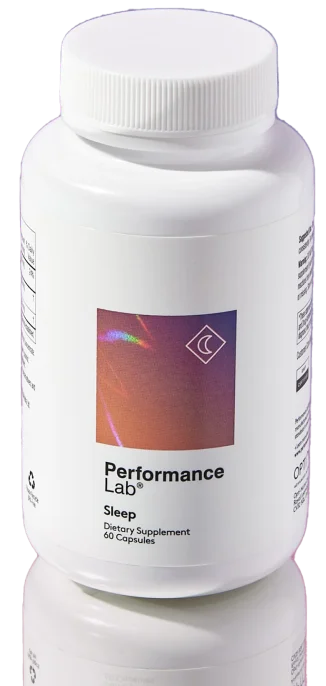Magnesium glycinate (also called magnesium bisglycinate) is a form of magnesium where one magnesium atom is attached to two glycine molecules.
Elemental magnesium is one of the most common minerals on earth and is the fourth most abundant mineral in the human body.
Key Takeaways
- Magnesium bisglycinate and glycinate are the same compound—“bisglycinate” is the chemical name; “glycinate” is the common name.
- Both forms deliver high bioavailability and excellent tolerability compared with other magnesium salts.
- Benefits include improved sleep, memory, blood pressure regulation, blood sugar control, and reduced muscle cramps.
- Magnesium deficiency is widespread, so supplementation is often helpful—especially for stress, sleep, and metabolic health.
- Performance Lab® Sleep and NutriGenesis® Multi deliver magnesium bisglycinate as part of clean, well-balanced formulas.

It’s involved in everything from energy metabolism and muscle contraction to DNA synthesis, blood glucose regulation, and reproduction.
But while magnesium is widely available in many food sources, most people don’t get enough—it’s estimated that nearly 50% of the US population doesn’t consume enough magnesium, making magnesium deficiencies pretty common.(1)
If you fall into the low-intake category and want to get your magnesium levels up to snuff, this article breaks down two types of magnesium supplements.
We’ll provide an in-depth comparison of both magnesium bisglycinate and magnesium glycinate supplements and which is the better option for improving magnesium status.
What is magnesium glycinate and magnesium bisglycinate?

You’ve likely heard of magnesium before, but if you’re not familiar with the many types of magnesium, let us enlighten you on this essential mineral.
In the supplement section of your local health food store, here’s what you might see:
- Magnesium Citrate
- Magnesium Oxide
- Magnesium Aspartate
- Magnesium Chloride
- Magnesium Lactate
- Magnesium Malate
- Magnesium Taurate
- Magnesium Glycinate
- Magnesium Orotate
- Magnesium Sulfate
- Magnesium Threonate
Yep, 11 forms of magnesium, all of which are magnesium at the core but vary in bioavailability and how they work in the human body. Of those eleven forms, there’s one we want to hone in on: magnesium glycinate.
Magnesium glycinate is a chelated form of magnesium, meaning it’s easily absorbed by the body and provides high bioavailability. It is attached to two molecules of the non-essential amino acid glycine.
Magnesium bisglycinate, which is the technical name for magnesium glycinate, is also a chelated form of magnesium with high bioavailability.
But what’s the difference?
There isn’t one!
Magnesium glycinate is the common name for the compound with the chemical formula C4H8MgN2O4. It is a single magnesium molecule linked to two glycinate ions to form a salt. But what’s the difference between magnesium glycinate and bisglycinate?
Magnesium bisglycinate is the accurate chemical name, whereas magnesium glycinate is the common name.
In terms of chemical structure and uses, magnesium glycinate and magnesium bisglycinate are identical.
Why we need a magnesium supplement
So, why do we need magnesium dietary supplements? Magnesium is a cofactor for more than 300 enzymatic reactions that are involved in the following:
- Blood pressure regulation
- Protein synthesis
- Energy metabolism
- Blood glucose and insulin metabolism
- Heartbeat regulation and muscle function
- Neurotransmitter functions
- Nitric oxide balance
- Growth and development in babies and children
- Muscle and nerve function
- Stomach acid production and overall digestive tract health
Magnesium bisglycinate benefits
It promotes sleep

Many people rely on dietary magnesium intake to support sleep, thanks to its ability to reduce central nervous system activity, relax muscles and reduce stress, helping people fall asleep faster and stay asleep better.(2)
Low magnesium levels have been shown to cause sleep interruptions and may contribute to insomnia.
A 2012 study looked at the effect of 500 mg/day of magnesium on 46 elderly people with insomnia for eight weeks(3).
They found that a magnesium supplement improved subjective measures of insomnia, including sleep efficiency, sleep time and onset latency, early morning awakening, and objective measures like serum renin, melatonin, and cortisol concentrations.
It can also help promote a healthy circadian rhythm—the internal “clock” that controls our sleep-wake cycles(4).
It supports memory
Are you struggling to remember things? You might need a magnesium supplement! Studies have shown that magnesium bisglycinate can help reduce daytime sleepiness by supporting sleep and can enhance memory.
A 2010 study published in Neuron found that increasing brain magnesium levels can enhance learning abilities, working memory, and short- and long-term memory in rodents.(5)
It can reduce blood pressure
Hypertension is one of the most common cardiovascular diseases worldwide, and simple diet and lifestyle factors—like adding more magnesium to your diet or a magnesium supplement—can help lower blood pressure and improve cardiovascular health.
Studies show that, especially for people who have an existing magnesium deficiency, increasing magnesium levels can benefit high blood pressure, helping to reduce both systolic and diastolic blood pressure(6).
How does it do this? There are several ways(7):
- Acts as a natural calcium channel blocker
- Helps maintain sodium balance
- Increases vasodilating prostaglandin E1 (magnesium deficiency reduces levels of PGE1 and causes vasoconstriction)
- Regulates potassium levels
- Boosts nitric oxide production
- Improves endothelial dysfunction
- Stimulates vasodilation
It regulates blood sugar
For people that struggle to maintain healthy blood sugar levels, you know it’s not always easy—but magnesium might be a valuable tool for helping.
Magnesium plays a vital role in regulating blood glucose and insulin through several mechanisms, and studies have linked high magnesium diets to a lower risk of type 2 diabetes(8).
Research has shown that magnesium bisglycinate helps the body break down sugars to maintain healthy blood sugar levels and may reduce the risk of insulin resistance—a precursor to diabetes(9, 10).
It supports strong bones
When it comes to bone health, calcium and vitamin D tend to get most of the attention, but magnesium has its place, too(11).
Adequate levels of magnesium are required for the absorption of vitamin D and calcium, and studies show that a magnesium deficiency increases the risk of osteoporosis directly by interfering with crystal formation and on bone cells and indirectly by affecting the secretion and the activity of parathyroid hormone (PTH) and by promoting low-grade inflammation(12).
It may provide relief for migraines and headaches

What’s the link between magnesium and headaches/migraines? Some experts believe magnesium may block the signal in the brain that causes migraines with an aura or alters vision and other senses.
Although the mechanism of how it’s involved isn’t clear, research finds that people who frequently experience headaches and migraines tend to have lower magnesium levels than people who don’t(13). As such, correcting a magnesium deficiency may offer relief from migraines.
It can reduce or treat symptoms of PMS
Studies show that magnesium can help manage PMS symptoms by calming the nervous system and normalizing the actions of various hormones, especially progesterone.
It can also relax the smooth muscle of the uterus and reduce prostaglandins that cause menstrual pain(14, 15).
Many women struggle with painful and uncomfortable periods, and reducing symptoms of PMS may be as easy as supplementing with bismagnesium.
Other benefits of magnesium bisglycinate may include the following:
- Reducing leg cramps during pregnancy
- Fewer muscle cramps and spasms
- Improve athletic performance and accelerate recovery
Magnesium bisglycinate side effects
There’s no shortage of benefits to taking magnesium bisglycinate, but are there any side effects of taking it?
Generally speaking, magnesium supplements are considered safe and well tolerated, and pose little risk for toxicity. However, in high doses, some of the most common side effects include:
- Diarrhea or loose stools
- Abdominal cramping
- Digestive upset
These symptoms are more common for magnesium oxide and citrate, which have laxative effects in high doses. Luckily, magnesium bisglycinate is associated with the fewest side effects and may be the best form for people with GI issues(16).
Keep in mind that both excessive magnesium intake and a magnesium deficiency are equally as problematic. So finding the appropriate dose of any supplement, including magnesium glycinate supplements, is important.
Why is magnesium bisglycinate considered the superior supplemental form?
If you’ve read anything about magnesium, you’ve probably heard that magnesium glycinate or bisglycinate is the ideal form. Why? One major reason: high bioavailability, also known as absorption.
Most forms of magnesium are poorly absorbed by the body. For example, magnesium oxide has an absorption rate of less than 4% (17). But if you want to reap the benefits of magnesium, it needs to be effectively absorbed.
Because magnesium bisglycinate is attached to two glycine molecules, it attracts less water. Attracting more water creates osmotic pressure, which could cause diarrhea and cramps. It also has a much higher absorption rate(18). The glycine also helps reduce the pH in the small intestine, further supporting its absorption and preventing a magnesium deficiency.
The other reason magnesium bisglycinate is superior is the glycine itself.
Glycine is a non-essential amino acid and neurotransmitter with various health benefits, ranging from increasing relaxation, supporting mood and memory, improving sleep, and more.
Where to find magnesium bisglycinate
Whatever the reason for taking magnesium bisglycinate, finding an effective magnesium supplement can be tricky.
Most conventional magnesium supplements are loaded with additives and fillers or poor-quality magnesium that’s not well absorbed.
Luckily, there’s one magnesium supplement that skips all the nasties and supports better sleep and optimal function: Performance Lab® Sleep.


Unlike most sleep supplements that supply synthetic high-dose melatonin, Performance Lab® Sleep provides natural low-dose melatonin from CherryPURE® Montmorency Tart Cherry with additional joint- and muscle-soothing antioxidants to promote a deeper, more restorative sleep than any synthetic sleep supplement.
Sleep also supplies three magnesium forms (including NutriGenesis®) for sleep-supportive muscle relaxation and optimal well-being.
It overcomes the typical challenges of magnesium with an advanced 3x matrix designed for high bioavailability and superior sleep support:
- Magnesium Bisglycinate: A chelated mineral form bound with glycine (another sleep-supportive amino acid) that enables maximum absorption.
- Magnesium Taurate: Binds magnesium with taurine, an amino acid that promotes the relaxing and calming brain chemical GABA for additional sleep onset support.
- NutriGenesis® Magnesium: Performance Lab®’s nutrition technology breakthrough supplies clean, probiotic-cultured magnesium complexed with absorption-boosting cofactors.
References
- Rosanoff A, Weaver CM, Rude RK. Suboptimal magnesium status in the United States: are the health consequences underestimated?. Nutr Rev. 2012;70(3):153-164.
- Cuciureanu MD, Vink R. Magnesium and stress. In: Vink R, Nechifor M, editors. Magnesium in the Central Nervous System (Internet). Adelaide (AU): University of Adelaide Press; 2011. Available from: https://www.ncbi.nlm.nih.gov/books/NBK507250/
- Abbasi B, Kimiagar M, Sadeghniiat K, Shirazi MM, Hedayati M, Rashidkhani B. The effect of magnesium supplementation on primary insomnia in elderly: A double-blind placebo-controlled clinical trial. J Res Med Sci. 2012;17(12):1161-1169.
- Feeney KA, Hansen LL, Putker M, et al. Daily magnesium fluxes regulate cellular timekeeping and energy balance. Nature. 2016;532(7599):375-379
- Slutsky I, Abumaria N, Wu LJ, et al. Enhancement of learning and memory by elevating brain magnesium. Neuron. 2010;65(2):165-177.
- Zhang X, Li Y, Del Gobbo LC, et al. Effects of Magnesium Supplementation on Blood Pressure: A Meta-Analysis of Randomized Double-Blind Placebo-Controlled Trials. Hypertension. 2016;68(2):324-333.
- Houston M. The role of magnesium in hypertension and cardiovascular disease. J Clin Hypertens (Greenwich). 2011;13(11):843-847.
- Barbagallo M, Dominguez LJ. Magnesium and type 2 diabetes. World J Diabetes. 2015;6(10):1152-1157.
- Larsson SC, Wolk A. Magnesium intake and risk of type 2 diabetes: a meta-analysis. J Intern Med. 2007;262(2):208-214.
- Veronese N, Watutantrige-Fernando S, Luchini C, et al. Effect of magnesium supplementation on glucose metabolism in people with or at risk of diabetes: a systematic review and meta-analysis of double-blind randomized controlled trials (published correction appears in Eur J Clin Nutr. 2016 Dec;70(12 ):1463). Eur J Clin Nutr. 2016;70(12):1354-1359.
- Tucker KL. Osteoporosis prevention and nutrition. Curr Osteoporos Rep. 2009;7(4):111-117.
- Castiglioni S, Cazzaniga A, Albisetti W, Maier JA. Magnesium and osteoporosis: current state of knowledge and future research directions. Nutrients. 2013;5(8):3022-3033.
- Holland S, Silberstein SD, Freitag F, et al. Evidence-based guideline update: NSAIDs and other complementary treatments for episodic migraine prevention in adults: report of the Quality Standards Subcommittee of the American Academy of Neurology and the American Headache Society. Neurology. 2012;78(17):1346-1353.
- Parazzini F, Di Martino M, Pellegrino P. Magnesium in the gynecological practice: a literature review. Magnesium in the gynecological practice: a literature review. Magnes Res. 2017;30(1):1-7.
- Seifert B, Wagler P, Dartsch S, Schmidt U, Nieder J. Magnesium--eine therapeutische Alternative bei der primären Dysmenorrhoe (Magnesium--a new therapeutic alternative in primary dysmenorrhea). Zentralbl Gynakol. 1989;111(11):755-760.
- Ranade VV, Somberg JC. Bioavailability and pharmacokinetics of magnesium after administration of magnesium salts to humans. Am J Ther. 2001;8(5):345-357.
- Firoz M, Graber M. Bioavailability of US commercial magnesium preparations. Magnes Res. 2001;14(4):257-262.
- Schuette SA, Lashner BA, Janghorbani M. Bioavailability of magnesium diglycinate vs magnesium oxide in patients with ileal resection. JPEN J Parenter Enteral Nutr. 1994;18(5):430-435.















